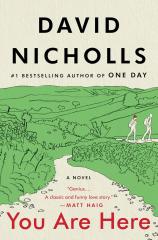You Are Here
Review
You Are Here
So you’re in the mood for a grown-up romantic read: witty but not slapstick, tender but not sentimental, with smart, flawed, undeniably attractive characters who struggle with themselves --- and each other --- on the path to love.
David Nicholls is your man. You might remember a little book of his from 2009, made into a film and, more recently, a smash hit miniseries. It’s called ONE DAY. (Other delicious titles --- I’ve read them all --- include US from 2014, also made into a miniseries, and SWEET SORROW from 2019.) Although Dex and Em’s story is still quite fresh in my mind and perhaps yours, I don’t want to imply that Nicholls’ latest, YOU ARE HERE, is a mere clone. The protagonists are older --- late 30s and 40s --- with tons of baggage, and the plot unfolds over a week or so rather than spanning years. Still, all his trademarks are there: zippy dialogue, a mix of humor and poignancy, and above all, people worth spending time with.
You are here is a map-related phrase, of course, and the book has a distinctly geographical flavor (plus actual maps). It involves a journey both psychological and literal: a coast-to-coast walking trip in the north of England, from the Irish Sea to the North Sea.
"[A]ll [Nicholls'] trademarks are there: zippy dialogue, a mix of humor and poignancy, and above all, people worth spending time with.... I adored it, and so will you."
So what does that have to do with love? Before we hit the trail, we make the acquaintance of one Marnie Walsh, a 38-year-old divorced Londoner who, as a freelance copyeditor and proofreader, doesn’t get out much. Although hardly athletic, Marnie is persuaded by her friend, Cleo, to join a group hike lasting three days. Cleo, it turns out, is also a colleague of Michael Bradshaw, a 42-year-old who teaches geography and plans to start with the others, then let them “drift away” as he continues solo for the entire 190 miles. He’s keen on long, solitary walks, mostly as a way of contending with a separation from his wife. Marnie and Michael take turns narrating the novel in short, punchy chapters, each with a cute but totally unnecessary title.
It’s a foregone conclusion that Marnie and Michael will connect. But Nicholls is too cool and expert to create a fake antagonism that later turns to mad passion. Instead, these two lost souls inch ever closer as the miles mount up (this is the slowest of slow-burn affairs). Rather than peeling off after three days like the others in the party, Marnie continues walking with Michael for an entire week. Plus, there’s a lot of action --- and I mean gut-wrenching hikes up mountains in the rain as well as emotional zigs and zags --- before we find out if they will get a happy ending.
Nicholls writes convincingly from the man and woman’s point of view, and he has given them a comparable level of anxiety and vulnerability, as well as a similar sense of humor. Marnie in particular has an almost compulsive need to wisecrack, whereas Michael is a nature nerd (he knows all about rivers, lakes, slate mining, birds and stones). Soon the two of them find their rhythm and toss words back and forth as in a badminton match (of a breakfast cereal called Fruit and Fibre: “‘Together at last!’ ‘Classic combination.’ ‘Like Lennon and McCartney’”). In contrast, Marnie’s attempts to converse with Conrad, a handsome pharmacist who comes on the first part of the walk, fall utterly flat. As he natters on about car racing, she muses that it falls into “a category of things that appeal to men, like wetsuits and samurai swords and big watches. Conrad’s own watch was the size of a pub ashtray.”
M&M also have heart-to-hearts that touch on serious subjects: the taboo against taking pleasure in one’s own singular company (a funny/true passage on “the buzz of the cancelled plan”), for example, and the way married friends with children patronize the unmarried and childless (Marnie describes, in Jane Austenesque phrasing, how people think “a single woman in her late thirties must be in want of a child”).
Both Marnie and Michael are so unaccustomed to joy, so afraid to hope, that they only gradually accept that they are having a great time (“Michael had accidentally been lulled into enjoying himself”; Marnie had an unusual “sensation of optimism and receptiveness”). You root for them not to screw it up, but you also wish them to find a certain peace and contentment on their own.
I have only a few quibbles. Possibly the two voices verge on being too much the same once Michael moderates his teacherly persona. Sometimes I feel that Nicholls pumps up the suspense by withholding information for too many chapters (How did Michael get that scar? What happened when he met his ex in a hotel room?), which made me feel a bit manipulated. And I was distressed to find a number of copy-editing lapses that Marnie herself would have flagged!
But, reader, I adored it, and so will you. It’s not about the rush of youthful ardor like ONE DAY; the title YOU ARE HERE suggests a mature striving to be emotionally present, and that’s exactly what Marnie and Michael are attempting. Nicholls, in a recent interview in The Guardian, describes this book as being “much more thoughtful and gentle, a bit more grounded.” It’s romance for a different stage of life.
That’s fair. What isn’t fair is his remark, in the same interview, that his next novel won’t be “another love story.” David, say it isn’t so!
Reviewed by Katherine B. Weissman on June 1, 2024




